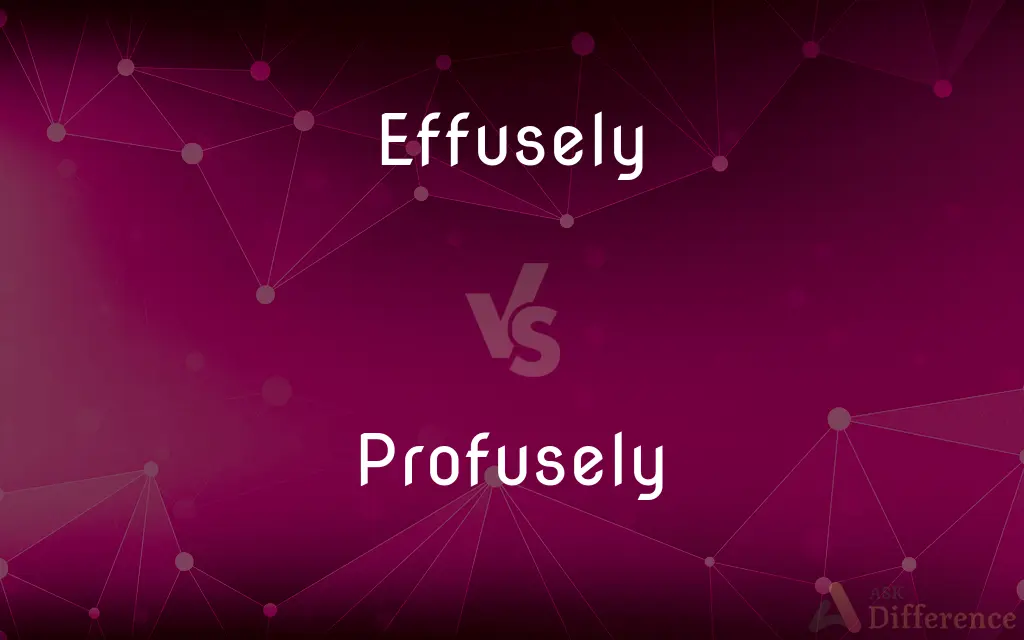Effusely vs. Profusely — What's the Difference?
By Maham Liaqat & Urooj Arif — Updated on March 20, 2024
Effusely is not a standard English word, whereas profusely means in large amounts or to a great degree.

Difference Between Effusely and Profusely
Table of Contents
ADVERTISEMENT
Key Differences
Effusely is often confused with "effusively," which refers to expressing feelings in an unrestrained or heartfelt manner. On the other hand, profusely is a term that is correctly used to describe something done abundantly or to a great extent, such as sweating profusely or apologizing profusely.
While "effusively" relates to the emotional intensity and expressiveness of an action or speech, profusely deals with the quantity or intensity of a physical or metaphorical action, such as bleeding, sweating, or expressing gratitude.
The confusion between effusely and effusively highlights the importance of precise language, especially when conveying the intensity of actions or emotions. In contrast, the use of profusely is more straightforward, typically associated with physical actions or the extent of something.
In terms of context, effusive (the correct form related to effusely) is often used in social and emotional contexts, like describing someone's warm and enthusiastic greeting. Profusely, however, can be used in both physical contexts (like bleeding or sweating) and metaphorical contexts (like apologizing or thanking).
Comparison Chart
Definition
(Effusively) Expressing feelings unrestrainedly or enthusiastically.
Doing something abundantly or to a great degree.
ADVERTISEMENT
Usage Context
Emotional and social interactions.
Physical actions and metaphorical expressions of quantity or intensity.
Connotation
Emotional warmth, enthusiasm, or passion.
Large amount, intensity, or extent.
Common Associations
Greetings, compliments, expressions of affection.
Sweating, bleeding, apologizing, thanking.
Example
"She spoke effusively about her mentor."
"He apologized profusely for the mistake."
Compare with Definitions
Effusely
Expressing emotions in a very open and unrestrained manner.
He effusively praised the team's effort.
Profusely
Characterized by a generous or excessive amount.
The tree bore fruit profusely this year.
Effusely
Characterized by a flow of heartfelt expressions.
His effusive nature made him many friends.
Profusely
In large amounts or to a great extent.
He was sweating profusely during the workout.
Effusely
Showing enthusiasm or warmth abundantly.
She was greeted effusively at the reunion.
Profusely
Abundantly or excessively.
Flowers bloomed profusely in the spring garden.
Effusely
Demonstrating passion or fervor in expression.
She spoke effusively of her love for art.
Profusely
Expressing something extensively or with intensity.
She apologized profusely for the late arrival.
Effusely
Overflowing with emotion or feeling.
The award winner's speech was effusive and moving.
Profusely
Emitting or producing something in large quantities.
The broken pipe leaked water profusely.
Effusely
In an effuse manner.
Profusely
Plentiful; copious.
Profusely
Giving or given freely and abundantly; extravagant
Were profuse in their compliments.
Profusely
In great quantity or abundance; in a profuse manner.
The run left him sweating profusely.
Profusely
In a profuse manner.
Profusely
In an abundant manner;
They were abundantly supplied with food
He thanked her profusely
Common Curiosities
What does "effusively" mean?
Effusively means expressing feelings or emotions in an unrestrained, enthusiastic, or heartfelt manner.
Can "effusively" and "profusely" be used interchangeably?
No, "effusively" pertains to the expression of emotions, while "profusely" relates to the abundance or intensity of an action or state.
Is "effusely" a common misspelling?
Yes, "effusely" is often a misspelling or misunderstanding of "effusively."
How might one express gratitude "profusely"?
Expressing gratitude profusely involves doing so in a very extensive or intense manner, often verbally and through actions.
How is "profusely" typically used?
Profusely is used to describe actions or states that occur in large amounts or to a great degree, such as sweating, bleeding, or apologizing.
What are examples of physical actions described as "profusely"?
Sweating, bleeding, or crying are physical actions that can be described as happening "profusely."
Can a garden bloom "effusively"?
While a garden cannot bloom "effusively" (a term related to emotional expression), it can bloom "profusely" (in abundance).
How does "effusively" relate to social interactions?
In social interactions, "effusively" describes interactions that are warm, enthusiastic, and emotionally expressive.
Can weather conditions be described as "profusely" raining?
It's more common to say "raining profusely" to describe very heavy rainfall.
Is it appropriate to use "profusely" in formal writing?
Yes, "profusely" can be appropriately used in formal writing when describing something in abundance or great extent.
Can someone speak "profusely"?
"Speak profusely" might imply speaking a lot or in great detail, but it's less common than using "profusely" to describe physical or quantitative aspects.
Can a performance be described as "effusive"?
A performance can be described as "effusive" if it's particularly expressive, enthusiastic, or emotive.
Is "profusely" ever used in a positive context?
Yes, "profusely" can be used positively, such as when describing something flourishing or being abundant in a desirable way.
What does it mean to apologize "profusely"?
Apologizing profusely means to do so very extensively or intensely, often emphasizing the sincerity and depth of the apology.
What is the impact of "effusive" communication in relationships?
Effusive communication can strengthen relationships by expressing genuine warmth and enthusiasm, fostering closer connections.
Share Your Discovery

Previous Comparison
Car vs. Taxi
Next Comparison
Desuetude vs. ObsolescenceAuthor Spotlight
Written by
Maham LiaqatCo-written by
Urooj ArifUrooj is a skilled content writer at Ask Difference, known for her exceptional ability to simplify complex topics into engaging and informative content. With a passion for research and a flair for clear, concise writing, she consistently delivers articles that resonate with our diverse audience.
















































